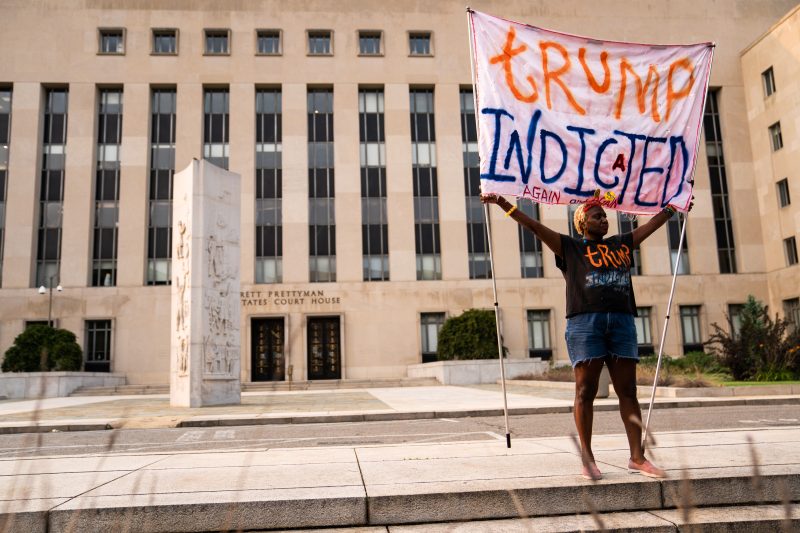The Donald Trump era in American politics has been defined in part by the assumption that something might at some point get in Trump’s way.
To date, this hasn’t really happened. Over the course of the 2016 Republican primaries, it was often assumed that Trump would flame out, that one of his controversial comments would prove too controversial and his political ambitions would be shattered. His competitors spent inordinate amounts of time and money assuming this would happen, and then it didn’t.
So then it was assumed that he would at least get chewed up by Hillary Clinton in the general election, which he didn’t — at least, not in three swing states that gave him his electoral college majority. So then the assumption transitioned to exogenous legal forces: Robert S. Mueller III’s probe or maybe impeachment would lead to his ouster. Nope.
In November 2020, the thing that derailed Trump was largely Trump: He was unpopular and his presidency was viewed broadly negatively. He lost to Joe Biden, with many of Biden’s voters indicating that their vote was less about the Democrat than the incumbent Republican.
Then 2023 arrived and Trump sought a comeback. Over the past 14 months or so, Trump’s held a lead in the Republican nominating contest — so much so that by last fall, it seemed pretty obvious that he would be the party’s nominee. But there were reasons to be cautious. After all, who knows! Something could happen.
Unlike in 2016, this “something” was often identifiable: The various indictments Trump faces could culminate in a conviction, potentially upending the primary fight. This wasn’t an irrational assumption, given that the indictments loomed and the repercussions of them were uncertain. But no conviction emerged and, as of writing, Trump’s renomination is a near certainty.
So we start the whole thing over. Yes, Trump leads in many polls of the general election, like one from NBC News released Sunday. But maybe Trump will be convicted of a crime, damaging his position — like in the NBC News poll released Sunday.
Maybe. Maybe not.
It is unquestionably useful that NBC News’s pollsters asked the question. (Specifically: “If Donald Trump is found guilty and convicted this year of a felony,” how would respondents vote?) NBC’s Mark Murray broke out some of the demographic shifts that resulted, comparing initial responses to the who-would-you-vote-for question with the if-indicted version.
Overall, there was a 7-point shift in the margin from Trump to Biden. Among younger voters, the shift was 15 points; among Latinos and independents, it was 11 points. Even among Republicans, the poll measured a 7-point drop in support for Trump should he be convicted of a felony this year.
In his write-up, though, Murray noted an important asterisk identified by one of the pollsters involved in the survey. The independents who shifted away from Trump in the post-conviction question, he wrote, “hold overwhelmingly negative opinions about Biden, and they also prefer a Republican-controlled Congress by more than 60 points.” It seems unlikely that this constitutes a certain, hard shift to Biden’s advantage. It indicates, instead, a shift from Trump support to supporting neither candidate at all.
We should consider this in the context of another element of the NBC News polling. Over the course of the past eight months, the network’s polling has gone from showing a 4-point Biden advantage to a 5-point Trump one. That shift, though, is largely a function of declining support for Biden rather than growing support for Trump.
Other polls have shown similarly that Trump’s improved position against Biden is often due to Biden’s softening support.
When we overlay this with polling (including NBC’s) showing that Biden backers are again often centered on opposition to Trump, we can generate a reasonable theory. Biden voters aren’t thrilled about him but often choose him as an alternative to Trump. When Trump’s negative characteristics aren’t salient — as when the economy or immigration are focal points of the campaign, both issues on which Trump fares well relative to Biden — some of Biden’s support fades. Presented with a starkly negative scenario for Trump, though, it resolidifies.
Whether Trump is convicted of a felony before the election remains to be seen. It is probably not the case that his D.C. trial centered on efforts to subvert the 2020 election will conclude by then, given that it is currently on hold pending resolution of Trump’s immunity claim. (In a new CNN-SSRS poll, about half of respondents said it was “essential” this trial be resolved before November.) He may be convicted elsewhere, like in New York City — where he faces charges that many view as less concerning.
It is easy to be cynical here, certainly, and assume that even a federal conviction on charges brought by special counsel Jack Smith wouldn’t have much effect on Trump’s support. The past eight years have certainly offered plenty of reasons to make such an assumption.
But a conviction might actually have a negative effect on Trump, if only somewhat indirectly: giving voters who don’t love either candidate a reason to go out and cast a ballot for Biden — and making some Trump voters less likely to show up to vote.
In other words, not the out-of-the-blue derailment of Trump’s candidacy that he’s managed to avoid for the past eight years.

